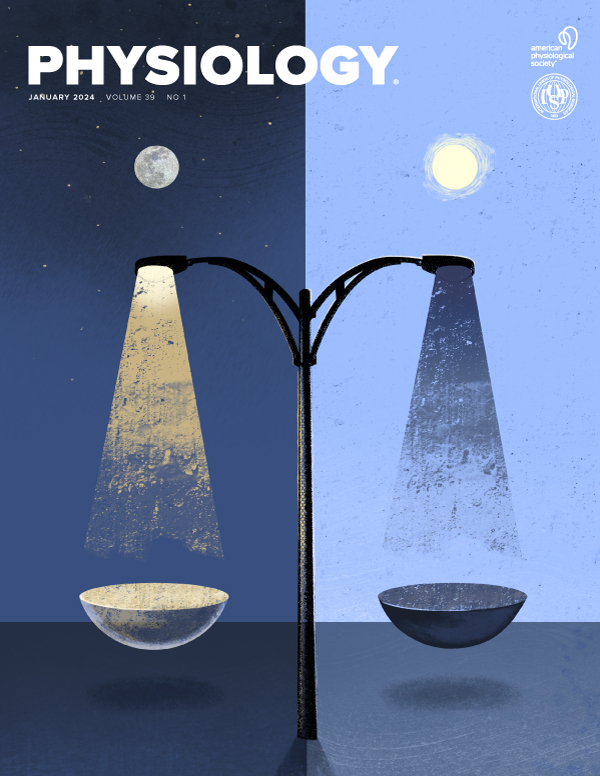Pain and Plasticity: Spike Sorting Based Approach for Characterizing the Neural Circuitry Mediating Nociceptive Sensitization of the Defensive Strike Response in M. sexta
IF 10.3
2区 医学
Q1 PHYSIOLOGY
引用次数: 0
Abstract
Nociception is the neural process of encoding and processing noxious stimuli; this sensation is transduced by specialized sensory neurons called nociceptors. Activation of nociceptors typically evoke so called “nocifensive behavioral responses,” that are generally aimed at decreasing exposure to the noxious stimulus. Intense activation of nociceptors can result in long lasting changes in the nervous system, as well as a subsequent decrease in the threshold for perceiving and acting upon stimuli as if it were harmful—this persistent change in the organism is nociceptive sensitization. The hornworm, Manduca sexta, displays rapid defensive “striking” behavior that accurately targets the cite of noxious stimulation of the abdominal body wall. Nociceptive sensitization of the defensive strike response has been induced behaviorally and recapitulated in vitro through extracellular electrophysiology, where it appears to be encoded by an increase in the firing frequency occurring within the central nervous system, rather than changes in peripheral nociceptor signaling. The current model proposed by Tabuena et al. (2017), argues that central neural alterations are responsible for the neural correlate of nociceptive sensitization (Tabuena et al., 2017), rather than changes in spiking activity of the primary sensory neurons. While the changes in firing frequency centrally are undisputed, relegating sensitization to the CNS alone may be overly simplistic, as the model is based on the comparison of threshold crossings of purported multiunit activity, rather than of single cell activity of known populations of sensory and/or higher order neurons. Moreover, studies in the vertebrate and invertebrate literature alike have reported retrograde sensitization of primary nociceptors (Parada et al., 2003; Xie et al., 2022; Babcock et al., 2000), mediated by inflammatory signals from the cite of injury, thus complicating the question of central versus peripheral sensitization. Therefore, it is worth re-examining the possibility of presynaptic plasticity as an added contribution to nociceptive sensitization. In this work, we propose leveraging available neuroanatomical data to re-analyze the Tabuena et al. dataset, by performing spike sorting and spike train analyses to tease apart the signals originating from the peripheral sensory neurons to obtain input/output relationships between the identified sensory units and VNC spiking during stimulation. Distinguishing the nociceptor and tracking its stimulus dependent firing is expected to elucidate the contribution of nociceptor activity in nociceptive sensitization. Genentech Scholars Foundation This is the full abstract presented at the American Physiology Summit 2023 meeting and is only available in HTML format. There are no additional versions or additional content available for this abstract. Physiology was not involved in the peer review process.疼痛和可塑性:基于脉冲分类的神经回路表征方法介导防御性打击反应的伤害敏感化
伤害感觉是对有害刺激进行编码和加工的神经过程;这种感觉是由称为伤害感受器的特殊感觉神经元传导的。伤害感受器的激活通常会引起所谓的“有害行为反应”,这种反应通常旨在减少对有害刺激的暴露。痛觉感受器的强烈激活会导致神经系统长期持续的变化,以及随后感知刺激和对刺激做出有害反应的阈值的降低——这种持续的变化就是痛觉敏化。这种名为Manduca sexta的角虫表现出快速的防御性“攻击”行为,准确地瞄准了对腹壁的有害刺激。防御性打击反应的伤害性敏化已经在行为上被诱导,并在体外通过细胞外电生理学重现,其中它似乎是由中枢神经系统内发生的放电频率增加编码的,而不是外周伤害感受器信号的变化。Tabuena等人(2017)提出的当前模型认为,中枢神经的改变是造成伤害性敏化的神经关联的原因(Tabuena等人,2017),而不是主要感觉神经元尖峰活动的变化。虽然中心放电频率的变化是无可争议的,但将致敏性单独归于中枢神经系统可能过于简单,因为该模型是基于对所谓的多单元活动的阈值交叉的比较,而不是基于已知的感觉和/或高阶神经元群体的单细胞活动。此外,脊椎动物和无脊椎动物的研究文献都报道了初级伤害感受器的逆行致敏(Parada et al., 2003;谢等,2022;Babcock等人,2000),由来自损伤的炎症信号介导,从而使中枢与外周致敏的问题复杂化。因此,值得重新研究突触前可塑性作为伤害敏感化的额外贡献的可能性。在这项工作中,我们建议利用现有的神经解剖学数据来重新分析Tabuena等人的数据集,通过执行尖峰排序和尖峰序列分析来梳理来自周围感觉神经元的信号,以获得在刺激期间识别的感觉单元和VNC尖峰之间的输入/输出关系。区分伤害感受器并追踪其刺激依赖性放电有望阐明伤害感受器活动在伤害致敏中的作用。这是在2023年美国生理学峰会上发表的全文摘要,仅以HTML格式提供。此摘要没有附加版本或附加内容。生理学没有参与同行评议过程。
本文章由计算机程序翻译,如有差异,请以英文原文为准。
求助全文
约1分钟内获得全文
求助全文
来源期刊

Physiology
医学-生理学
CiteScore
14.50
自引率
0.00%
发文量
37
期刊介绍:
Physiology journal features meticulously crafted review articles penned by esteemed leaders in their respective fields. These articles undergo rigorous peer review and showcase the forefront of cutting-edge advances across various domains of physiology. Our Editorial Board, comprised of distinguished leaders in the broad spectrum of physiology, convenes annually to deliberate and recommend pioneering topics for review articles, as well as select the most suitable scientists to author these articles. Join us in exploring the forefront of physiological research and innovation.
 求助内容:
求助内容: 应助结果提醒方式:
应助结果提醒方式:


